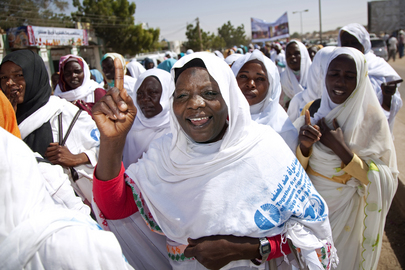Monitoring Gender Mainstreaming Within The African Regional Organisations
The goal of this initiative is to ultimately change behaviors and practices within African regional organisations towards a truly gender sensitive and women positive structure. We hope to achieve this through a number of stages, the first being the ‘monitoring phase’ in which MEWC, with the help of the wider women’s rights community, will monitor the efforts made within African regional organisations towards gender mainstreaming.
"Mainstreaming a gender perspective is the process of assessing the implications for women and men of any planned action, including legislation, policies or programmes, in any area and at all levels. It is a strategy for making the concerns and experiences of women as well as of men an integral part of the design, implementation, monitoring and evaluation of policies and programmes in all political, economic and societal spheres, so that women and men benefit equally, and inequality is not perpetuated. The ultimate goal of mainstreaming is to achieve gender equality."-ECOSOC 1997
Gender mainstreaming is not about adding a "woman's component" or even a "gender equality component" into an existing activity. It goes beyond increasing women's participation; it means bringing the experience, knowledge, and interests of women and men to bear on the development agenda. Make Every Woman Count views monitoring and documenting the political representation of women in African Regional organisations as a method to:
- To hold African Governments accountable
- Encourage them to acknowledge the need for goals, strategies, and actions so that both women and men can influence, participate in, and benefit from development processes but more importantly it is a tool .
- Contributing to the transformation of unequal social and institutional structures into equal and just structures for both men and women..
 UN Photo
UN Photo
What do we mean by gender mainstreaming? According to UN Women, Gender mainstreaming “is a globally accepted strategy for promoting gender equality. Mainstreaming is not an end in itself but a strategy, an approach, a means to achieve the goal of gender equality. Mainstreaming involves ensuring that gender perspectives and attention to the goal of gender equality are central to all activities - policy development, research, advocacy/ dialogue, legislation, resource allocation, and planning, implementation and monitoring of programmes and projects.” (https://www.un.org/womenwatch/osagi/gendermainstreaming.htm) More than that, gender mainstreaming also means that an organization should reflect a mission for gender sensitivity and equity in their hiring practices, their policies on sexual harassment in the work place, and workplace discrimination. Should an organization adopt a gender mainstreaming approach to development, the organization itself must reflect the goals it wishes to achieve in the field, from within the office place.
The monitoring of African Regional Organisations is therefore an ongoing project that we hope and encourage other organisations to actively participate with us. In this section of our website, we will continually publish information on African Regional Organisations including progress on programs in women, gender and development and monitor their gender equality implementation practices.
It has been very challenging for us to gather information on the number of women in senior position within the African Regional Organisations due to the fact that some of them do not have these information available. We will really appreciate if you can send us any information you may have regarding these organsiations to: This email address is being protected from spambots. You need JavaScript enabled to view it.
COMESA was founded in 1994 as a replacement to the Preferential Trade Area (PTA) which had existed since 1981. COMESA (as defined by its Treaty) was established 'as an organisation of free independent sovereign states which have agreed to co-operate in developing their natural and human resources for the good of all their people' and as such it has a wide-ranging series of objectives which necessarily include in its priorities the promotion of peace and security in the region.
The Economic Community of West African States (ECOWAS) consists of 15 countries who has as main aim to promote economic integration in "all fields of economic activity, particularly industry, transport, telecommunications, energy, agriculture, natural resources, commerce, monetary and financial questions, social and cultural matters"[i]. ECOWAS has four main entities: The Commission; The Parliament; The Community Court of Justice; and The ECOWAS Bank of Investment and Development. The Commission and the Bank for Investment and Development has the purpose of implementing policies, pursuing programmes and carry out development projects in its Member States.
ECCAS aims to achieve “collective autonomy,” raise the standard of living of its populations and maintain economic stability through harmonious cooperation. Its ultimate goal is to establish a Central African Common Market. ECOWAS is structurally divided into five entities: the Conference of Heads of State and Government; the Council of Ministers; the Secretariat General; the Court of Justice; and the Consultative Commission.[i] The Court of Justice is not yet operational.[ii]
The East African Community (EAC) is the regional intergovernmental organisation of the Republics of Kenya, Uganda, the United Republic of Tanzania, Republic of Rwanda and Republic of Burundi with its headquarters in Arusha, Tanzania. The EAC is an integral part of the African Economic Community.
The African Union was established on the 9th of July 2002. Except for Morocco, all of the fifty three African countries are members. The vision of the African Union is that of: “An integrated, prosperous and peaceful Africa, driven by its own citizens and representing a dynamic force in global arena.” It is the main pan-African governing body and thus sets the tone and standard for development and governing practices across the continent.
The Arab Maghreb Union is an economic and political union aimed at harmonizing the economic unity of the Northern African countries. However, because of a disagreement between Morocco and Algeria concerning, among many things, the Western Sahara, the union is currently inactive.
